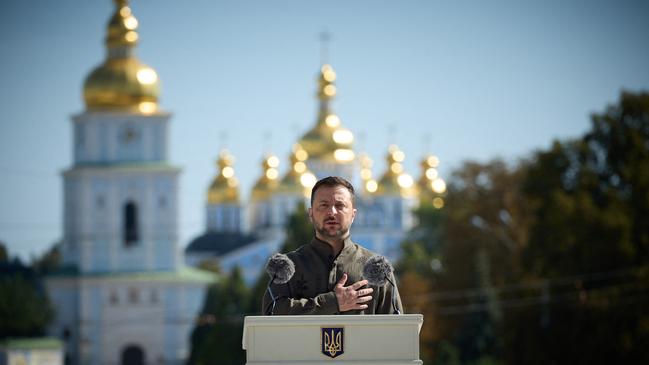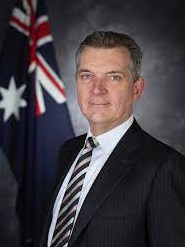‘Give us the tools, and we will finish the job’
Kyiv’s incursion into Russia’s Kursk region, which began on August 6, was both politically and militarily audacious.

Picture: AFP/UKRAINIAN PRESIDENTIAL PRESS SERVICE
President Vladimir Putin’s war of choice against Ukraine has lasted longer than the 900-day siege of his birthplace, Leningrad, by Hitler’s Wehrmacht during World War II.
The fortitude of that city’s inhabitants between 1941 and 1944 is revered to this day in Russia. It is tragically ironic that Leningraders’ resilience and sacrifice should be mirrored in the unbending will of Ukrainians to defend their homeland against the brutality of a neighbour which, unlike Nazi Germany, claims to be of one blood and ethnicity, and which three times had guaranteed Ukraine’s political sovereignty and territorial integrity.
In starting the first land war in Europe since 1945, Putin has created a security risk on his country’s borders where none had existed. The Kremlin’s propaganda line twists and squirms around the assertion that Russia was facing an ill-defined, existential threat from “the West”. The facts belie this.
Aside from slight and temporary lifts as it accepted new members from the Baltics and eastern Europe, NATO’s overall military expenditure – net of US outlays – had steadily declined between 1989, when the Warsaw Pact and the USSR itself began to crumble, and 2014, when Russia illegally occupied and annexed Crimea.
As the former head of the Russian International Affairs Council, Andrei Kortunov, said in January 2021: “Former Soviet republics have been desperately storming the gates of the Euro-Atlantic security structures, and the West, fully aware that accepting these new member states would weaken NATO, not strengthen it, had to respond to this pressure.”
Russia’s invasion of Ukraine in February 2022 transformed public opinion in Sweden and Finland, causing both nations to abandon longstanding policies of armed neutrality and join NATO.
Thus, by his own action, Putin has increased by some 1300km his country’s common border with its stated enemy. Whatever the military outcome of the war, Putin has guaranteed the enduring enmity of a nation of 40 million people traumatised and roused by the Kremlin’s campaign in occupied Ukraine of ethnic cleansing, cultural genocide, butchery, rape, and deliberate destruction of civilian infrastructure.
Against this backdrop, Kyiv’s incursion into Russia’s Kursk region, which began on August 6, was both politically and militarily audacious. It has echoes of the mammoth tank battle that raged in that region from July to August 1943, as Hitler vainly tried to regain the initiative after the Soviet encirclement and destruction of his 6th Army in Stalingrad a few months earlier.

It remains to be seen how successful this attack will be in blunting Russia’s offensive operations in the southeast. There is no sign yet that Moscow is diverting significant forces to counter Ukraine’s efforts. In fact, it is continuing to make incremental gains in the Donbas region, at great human cost. Military analysts have detailed the operational and tactical risks Kyiv faces if it seeks to hold substantial territory. Russia’s response is yet to manifest fully, but the initial missile strikes on Poltava and Lviv point to it being violent and bloody, and indifferent to civilian casualties.
President Volodymyr Zelensky said the goal was to create a “buffer zone”. Beyond this, taking more Russian prisoners and holding Russian ground even temporarily improves Ukraine’s position ahead of possible future negotiations and exchanges. Zelensky hopes to end the “hot war” this year.
A second peace conference is mooted for November, but it is unclear whether Russia – which was not invited to the first one in June – will participate. Even if it does, Putin’s preconditions for entering peace negotiations amount to Ukraine’s premature capitulation on Russia’s terms: almost total disarmament, political emasculation through imposed neutrality and a de facto Russian veto over Ukraine’s security and foreign policy choices, and the loss of all territory currently occupied or claimed by Moscow.
The political value of Kyiv’s boldness is evident. In seizing the initiative, even temporarily, Zelensky has boosted civilian and military morale at home and exposed the weaknesses of Putin’s system of control, which is riven by mistrust, suspicion, and deceit. These are evident in the indecision, confusion, and haplessness that has characterised the Kremlin’s response so far, both militarily and in managing civilian evacuations, accompanied by an incoherent and inconsistent narrative about what is happening. Russian domestic criticism of the Kremlin’s conduct of the war is growing. While it does not threaten Putin’s reign, it widens the cracks in his image as the guarantor of Russians’ security. It highlights the loss of confidence in the defence ministry, already beset by Putin’s continuing purge of senior generals and officials on corruption grounds.
Further illustrating war’s tragic irony, Kyiv’s gambit occurred in the same month as another political setback linking Putin to the name Kursk. The accidental sinking of the eponymous submarine on August 12, 2000, found the newly elected president unready for the public backlash and strident criticism of his inaction, which was magnified in the oligarch-controlled private media of the time. Startled and outraged, Putin began the crackdown that has since turned into full-scale suppression of dissent and resistance to his highly personalised “vertical of power”.
Kyiv’s military gamble comes on the eve of US presidential elections that will bear heavily upon Ukraine’s future. In France, President Emmanuel Macron struggles to advance his agenda in the face of the strong electoral performance of the political right, which is sympathetic to Putin. Media reports that Ukrainian operatives had sabotaged the Nordstream-2 gas pipeline in the Baltic Sea, and that German federal police had issued an arrest warrant for one, have provoked consternation in the German polity. Already tentative and halting, Berlin’s continued support for Ukraine may face greater hurdles still.
Ukraine’s message to Western governments is unambiguous and recalls Churchill’s famous broadcast in February 1941, in which, addressing the United States, he said: “We shall not fail or falter; we shall not weaken or tire. Neither the sudden shock of battle, nor the long-drawn trials of vigilance and exertion will wear us down. Give us the tools, and we will finish the job.”
-
Peter Tesch served as deputy secretary for strategy, policy and industry in the Defence Department from 2019-22. A career diplomat, his postings included ambassador to the Russian Federation (2016-19), and ambassador to Germany (2009-13).



To join the conversation, please log in. Don't have an account? Register
Join the conversation, you are commenting as Logout